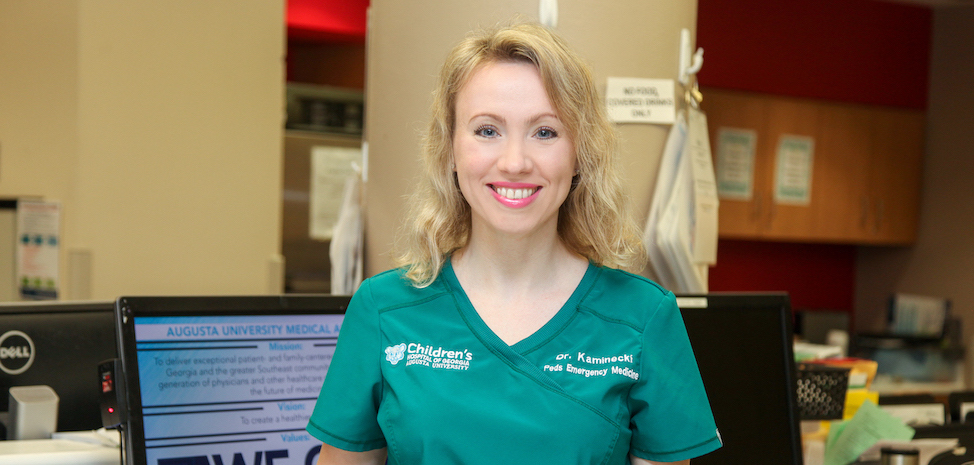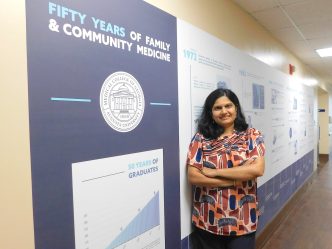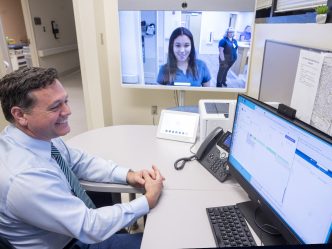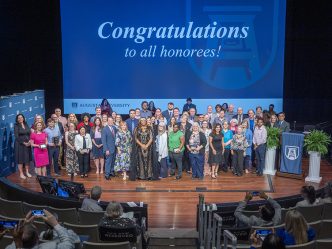Dr. Inna Kaminecki, a current fellow at the Medical College of Georgia, knew it was important for the public to get the clear answers they need when she began conducting telemedicine visits for Augusta University Health to screen people with symptoms related to COVID-19.
As part of her provider profile on telemedicine to offer free virtual screenings to the public for coronavirus, Kaminecki, a native of Ukraine, listed that she spoke both Ukrainian and Russian, as well as English.
Little did she know how much that information would mean to a woman seeking advice about her possible exposure to COVID-19.
“A woman, who was actually from Russia, but she had moved to Augusta a couple of years ago, called and wanted to discuss whether she qualified for screening for COVID-19,” said Kaminecki, who is a physician in the pediatric emergency department of the Children’s Hospital of Georgia. “Apparently, her son works at Augusta University and he mentioned to her that possibly she might need to be screened through telehealth because she had some symptoms.”
Through Augusta University Health System’s COVID-19 Virtual Screening, patients can receive free virtual screenings for coronavirus (COVID-19), 24 hours a day, seven days a week, with no appointment required, when they visit the AU Health COVID-19 Virtual Screening website or download the AU Health Express Care app for Apple or Android devices.
During the virtual screening, the provider asks about common symptoms of infection and duration, including fever, cough and shortness of breath, as well as questions related to medical history and risk of virus exposure.
If they screen positive, the information will automatically be sent to the Georgia Department of Public Health, which will schedule the patient for testing at their closest drive-thru location. Those who test negative will be provided their visit summary and be directed to an appropriate care site for further evaluation and treatment.
To the Russian woman’s surprise, when she called Augusta University Health’s telehealth platform, she immediately saw on Kaminecki’s profile that she spoke Russian.
“I think it was a major relief for this woman that she was able to talk to a provider who speaks Russian because as soon as she called, she told me she actually preferred to speak in Russian,” Kaminecki said.
“Even though her son is in health care and she already knew a little information about COVID-19, she had some technical questions about where the testing should be done and how it should be done. In fact, she actually qualified for screening for COVID-19, so I was able to refer her for screening and I could fully explain the testing process.”
Since COVID-19 is still such a new and mysterious virus, Kaminecki said it’s important for providers on telehealth to connect with the public and try to give them the best advice possible.
“After I referred her for screening, she has continued to write me some messages this week,” Kaminecki said, adding that messaging is an important aspect of Augusta University Health’s telemedicine visits. “Like a lot of people, she had some questions regarding how long it was going to take for the results to come back. So, I’m still talking to her and answering any questions she might have. We can continue to write back and forth.”
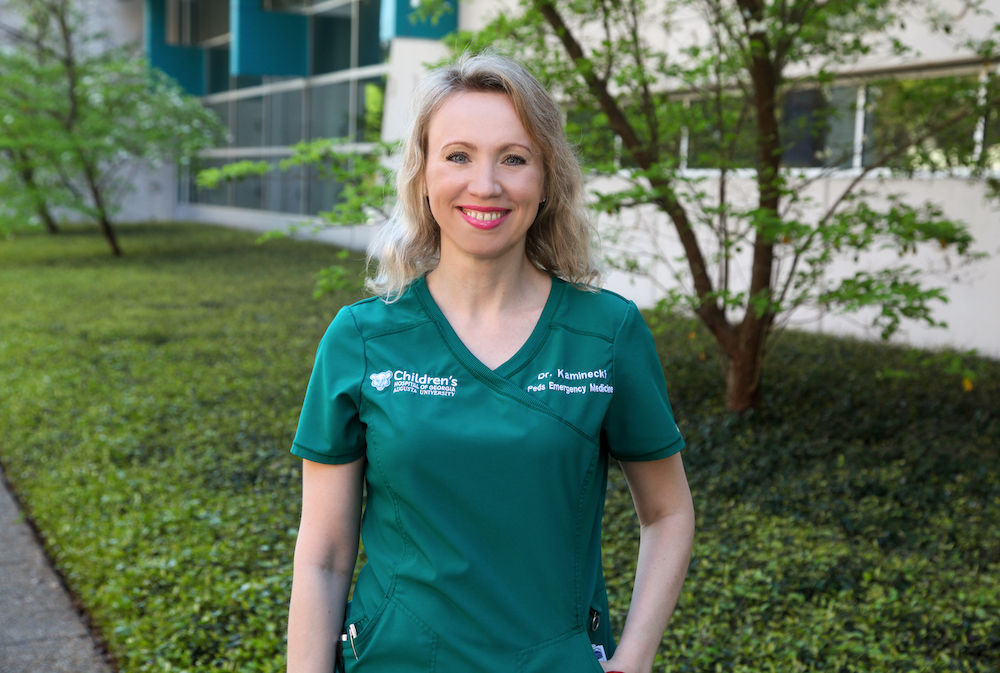
Kaminecki said there are several other physicians at Augusta University Health who speak different languages and have provided the same kind of support to concerned citizens during their telemedicine visits and COVID-19 virtual screenings.
“I think a lot of people feel very thankful that we are doing this kind of work and we can reassure them that we are here to help,” Kaminecki said. “I believe that’s what they really need sometimes. They need reassurance about whether they need testing or, even if they don’t need testing, what to do next to protect themselves from the coronavirus.”
As Kaminecki has continued to assist her patient from Russia through telehealth this week, she is grateful she was able to provide comfort and make a genuine human connection during this stressful time.
“I definitely think she enjoyed talking with me and she actually complimented me on my Russian,” Kaminecki said. “She said my Russian was perfect.”
Kaminecki admits she has her mother to thank for teaching her the language so well.
“While I’m Ukrainian, my mom is a teacher in the Russian language and, as a child, every time I would make a mistake in the Russian language, I would be corrected. My mom was very strict about it,” Kaminecki said, laughing. “So, I always had to make sure that my Russian was perfect.”
Ironically, Kaminecki said the more she talked to the woman on the other line, the more they discovered how much they had in common.
“It was funny because when I told her my mom was a teacher of Russian language, this woman told me she was a teacher of Russian language as well,” Kaminecki said, chuckling. “It’s a small world.”
 Augusta University
Augusta University
